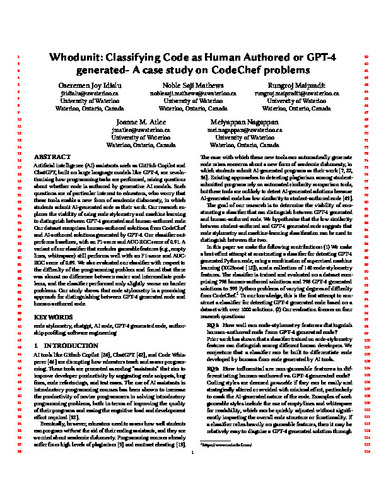| dc.contributor.author | Idialu, Oseremen Joy | |
| dc.contributor.author | Mathews, Noble Saji | |
| dc.contributor.author | Maipradit, Rungroj | |
| dc.contributor.author | Atlee, Joanne M. | |
| dc.contributor.author | Nagappan, Meiyappan | |
| dc.date.accessioned | 2024-03-07 15:16:50 (GMT) | |
| dc.date.available | 2024-03-07 15:16:50 (GMT) | |
| dc.date.issued | 2024-04-15 | |
| dc.identifier.uri | https://2024.msrconf.org/ | |
| dc.identifier.uri | http://hdl.handle.net/10012/20384 | |
| dc.description.abstract | Artificial intelligence (AI) assistants such as GitHub Copilot and ChatGPT, built on large language models like GPT-4, are revolutionizing how programming tasks are performed, raising questions about whether code is authored by generative AI models. Such questions are of particular interest to educators, who worry that these tools enable a new form of academic dishonesty, in which students submit AI-generated code as their work. Our research explores the viability of using code stylometry and machine learning to distinguish between GPT-4 generated and human-authored code. Our dataset comprises human-authored solutions from CodeChef and AI-authored solutions generated by GPT-4. Our classifier outperforms baselines, with an F1-score and AUC-ROC score of 0.91. A variant of our classifier that excludes gameable features (e.g., empty
lines, whitespace) still performs well with an F1-score and AUC-ROC score of 0.89. We also evaluated our classifier with respect to the difficulty of the programming problem and found that there was almost no difference between easier and intermediate problems, and the classifier performed only slightly worse on harder problems. Our study shows that code stylometry is a promising approach for distinguishing between GPT-4 generated code and human-authored code. | en |
| dc.language.iso | en | en |
| dc.publisher | Mining Software Repositories | en |
| dc.relation.ispartofseries | 21st International Conference on Mining Software Repositories; | |
| dc.relation.uri | https://zenodo.org/records/10153319 | en |
| dc.subject | code stylometry | en |
| dc.subject | chatgpt | en |
| dc.subject | AI code | en |
| dc.subject | GPT-4 generated code | en |
| dc.subject | authorship profiling | en |
| dc.subject | software engineering | en |
| dc.title | Whodunit: Classifying Code as Human Authored or GPT-4 generated- A case study on CodeChef problems | en |
| dc.type | Conference Paper | en |
| dcterms.bibliographicCitation | Idialu, O.J., Mathews, N.S., Maipradit, R., Atlee, J.M. & Nagappan, M. (2024). Whodunit: Classifying Code as Human Authored or GPT-4 generated- A case study on CodeChef problems. 21st International Conference on Mining Software Repositories. April 15-16 2024. Lisbon, Portugal., | en |
| uws.contributor.affiliation1 | Faculty of Mathematics | en |
| uws.contributor.affiliation2 | David R. Cheriton School of Computer Science | en |
| uws.typeOfResource | Text | en |
| uws.peerReviewStatus | Reviewed | en |
| uws.scholarLevel | Faculty | en |

